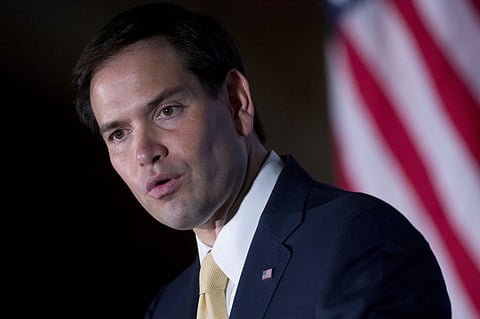Why Marco Rubio could upend 2016
It is becoming harder to foresee Republican primary voters endorsing Jeb and that is why Hillary may be wise to target Rubio rather than Jeb

Jeb Bush or Hillary Clinton? Two devils you know. For years people have discounted America’s next presidential choice. Yet, Marco Rubio, the 44-year-old Cuban-American from Florida, is rattling assumptions. Those who say the US would never choose a first-term senator over more experienced rivals have forgotten Barack Obama. Those who believe a minority candidate would have trouble winning the Republican nomination may be equally deluded. Conventional wisdom is unshakeable until it is proved wrong. No US politician today is better positioned to do so than Rubio.
There is no need to take my word for it: Read the signals from the Hillary and Jeb campaigns. In her first big speech since declaring, Hillary last week trained her sights on Rubio, rather than Jeb — a clear sign of whom she most fears. But she did so awkwardly. Two months after Rubio launched his bid with a speech that referred to Hillary as the candidate of “yesterday”, the former first lady quoted the eponymous Beatles song in an attempt to rebut the Miami upstart. It was not her best oratory. The Beatles broke up before Rubio was born. Hillary did not take any sideswipes at Jeb.
In his own launch last week, Jeb did take an obligatory swing at Hillary, but his mind was clearly on Rubio. The former governor of Florida, who also staged his launch in Miami, was introduced as “the Florida Republican who can win”. There was no point in “electing the people who either helped create [a broken Washington] or have proven incapable of fixing it”, said Jeb. His remark incorporated Ted Cruz and Rand Paul, the two other senators who are running. Unlike Rubio, neither is in the first rank of Republican hopefuls. Scott Walker, the other Republican frontrunner (polls confine the premier league to him, Jeb and Rubio), last week said he would choose Rubio as his running mate. What better way to sideline your chief rival?
White House campaigns are heavily shaped by biography and charisma. Rubio has a potent mix of both. His personal story could hardly be further removed from that of Hillary and Jeb. If their tales symbolise dynasty, Rubio’s is from Horatio Alger. To his followers, he personifies the American dream. The son of immigrants, Rubio’s father was a full-time bartender while his mother worked variously as a cleaner, a cashier and a chain store stock clerk. Audiences never tire of hearing Rubio’s line about his father tending bar at the back of the ballroom “so that one day his son could stand at a podium in the front”.
Both Hillary and Jeb show a detailed grasp of the crisis besetting America’s middle class — the uber-theme of next year’s election. Rubio has direct experience of it. Between the Jeb and Hillary campaigns there is an unspoken assumption that the other would cancel out their plutocratic vulnerabilities. Rubio will exploit both to the hilt. Then there is the age gap. At a time of cynicism about the brokenness of US politics, brand fatigue is a problem. Youth comes at a premium. So do movie star looks. “Yesterday is over,” says Rubio. “We must change the decisions we are making by changing the people who are making them.”
The headline polls may understate Rubio’s advantage. Alone among candidates on either side, he has positive favourability among Republican and Democratic voters. At 57 per cent among Republican primary voters, he is way ahead of Jeb (37 per cent). Although Jeb leads marginally in voters’ first preference, Rubio tops the second-choice rankings. In a fragmented field, that could count for a lot. Finally, Rubio is neck-and-neck with Jeb in the key swing states, including Ohio and Florida, and comes closest of any Republican to defeating Hillary in a head-to-head match-up.
If all this seems too good to be true, it probably is. Rubio has a fraction the executive record of either Jeb or Hillary and would probably flounder, Obama-style, in his first years in office. Choosing a president “without training wheels”, as Jeb suggests, may sink a bid if the poll were held in Washington. But it worries ordinary voters less.
Rubio’s weaknesses can also be turned to his advantage. Foremost is a tendency to bend with the wind. Two years ago, he sounded almost centrist on foreign policy. Today he vows to undo Obama’s alleged appeasement of America’s foes, chiefly Iran and Cuba. Likewise, he once stood out as progressive on immigration (how could he not?). Today he sounds as hardline as the rest of the Republican field.
Jeb has stuck to his principles. Yet veering to the right for the primaries and tacking back to the centre for the general election is an essential skill. It is hard to imagine Cruz or Walker convincing mainstream voters that they were only joking. It is also becoming harder to foresee Republican primary voters endorsing Jeb; which leaves Rubio.
Hillary may be wise to target him rather than Jeb. She, of all people, knows that the candidate who can best sing “Tomorrow” is capable of changing the game.
— Financial Times



